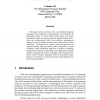Free Online Productivity Tools
i2Speak
i2Symbol
i2OCR
iTex2Img
iWeb2Print
iWeb2Shot
i2Type
iPdf2Split
iPdf2Merge
i2Bopomofo
i2Arabic
i2Style
i2Image
i2PDF
iLatex2Rtf
Sci2ools
125
click to vote
AIM
2005
2005
Description Logics and Planning
This paper surveys previous work on combining planning techniques with expressive representations of knowledge in description logics to reason about tasks, plans, and goals. Description logics can reason about the logical definition of a class and automatically infer class-subclass subsumption relations as well as classify instances into classes based on their definitions. Descriptions of actions, plans and goals can be exploited during plan generation, plan recognition, or plan evaluation. These techniques should be of interest to planning practitioners working on knowledge-rich application domains. Another emerging use of these techniques is the semantic web, where current ontology languages based on description logics need to be extended to reason about goals and capabilities for web services and agents.
AIM 2005 | AIM 2006 | Class-subclass Subsumption Relations | Description Logics | Expressive Representations |
Related Content
| Added | 15 Dec 2010 |
| Updated | 15 Dec 2010 |
| Type | Journal |
| Year | 2005 |
| Where | AIM |
| Authors | Yolanda Gil |
Comments (0)

